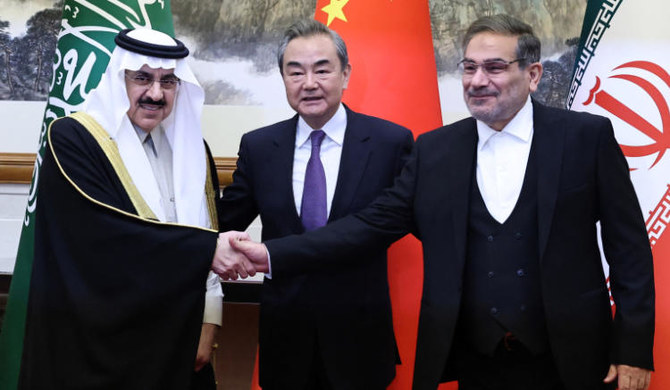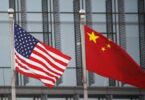Hassan Al-Mustafa
Over the past few months, during my visits to the Saudi capital, Riyadh, and my discussions with different people on the developments of the relationship between Saudi Arabia and Iran, I realized there was a general agreement that the Islamic Republic of Iran, a neighboring country, should have normal diplomatic relations with Saudi Arabia, that there is nothing against the Iranian people, and that the only way to resolve the existing differences is transparent and practical dialogue.
So, there is a prevailing agreement among important elites that good relations between Tehran and Riyadh are a Saudi interest in the first place, and that they would support the stability and security of the Arab Gulf and help to address the roots of regional tension. Without such relations, the region will continue to suffer from turmoil and security crises, which may develop into a direct armed confrontation, with dire consequences for everyone. Saudi Foreign Minister Prince Faisal bin Farhan expressed this Saudi conviction in an interview with Asharq Al-Awsat newspaper last week. He said: “We, in the Kingdom, hope to open a new chapter with Iran and bolster cooperation that would consolidate security and stability and push forward development and prosperity, not just in both our countries, but the entire region.”
But why this Saudi position? In my opinion, there is a big project called Saudi Vision 2030 and, for this vision to succeed, it needs an atmosphere of security and economic stability. This vision cannot achieve its goals if tensions persist in the Arabian Gulf and acts of piracy, terrorism and the targeting of vital oil installations continue. In addition, the Saudi government does not want to deplete its budget with conflicts and wars, but rather it wants to invest in infrastructure and projects such as NEOM, Qiddiya, Riyadh Air and The Red Sea project that will bring more tourists, create new jobs, contribute to advancing the local economy and diversify the Kingdom’s sources of income.
Moreover, there is a decades-old Saudi diplomacy based on avoiding external clashes and the desire to reach peaceful solutions as much as possible. Even when Riyadh severed its relations with Tehran in 2016, it took this measure only after angry Iranian protesters attacked Saudi diplomatic missions in Iran. The Yemen war was also not the preferred option for Saudi Arabia, but the Houthi group’s occupation of the Yemeni capital, Sanaa, its threat to Saudi Arabia’s borders and the Kingdom’s worry of real danger prompted it to defend its national interests. Saudi Arabia cannot accept the presence of an armed group linked to a foreign country on its borders, nor allow the Hezbollah experience in Lebanon to be replicated in Yemen, giving Iran, and specifically the Islamic Revolutionary Guard Corps, a security and military depth that can be exploited to harm Saudi interests.
Therefore, while the Saudi armed forces protected their homeland and struck the military capabilities of the Houthis, the Kingdom continued, at the same time, efforts to solve the problem through political dialogue, consolidation of the armistice and ceasefire, and entering into direct talks aimed at stopping the Yemeni war and forming a government of national unity in Yemen that includes the Houthis to start the process of rebuilding. Returning to the discussions that took place during my visits to Saudi Arabia, there was, as I indicated, a desire to solve problems with Iran. However, at the same time, there was a history of distrust due to the multiple centers of power in Iran on the one hand and its failure to abide by its commitments more than once on the other. This made supporters of dialogue prefer to slow down and ask whether the Iranian leaders were serious this time about reaching permanent good relations with Saudi Arabia.
It is not possible to predict what the Iranian leadership is thinking. However, what is certain is that the agreement announced in Beijing on March 10 between Saudi Arabia and Iran, under Chinese auspices, would not have taken place without a strong Iranian desire to ease tensions with neighboring countries. It must have realized that, for years, it suffered from regional isolation, its economy declined and it lost much of its reputation, which reflected negatively on the internal situation, causing several social and economic disturbances.
Hassan Fahs, a Lebanese researcher specializing in Iranian affairs, said in an article published on the Independent Arabia website that the Iranian side “has reached an implicit conviction and recognition of the strategic mistake that the regime contributed to making about seven years ago, when it allowed some extremist groups to violate all diplomatic norms and international covenants that protect diplomatic representations and attack the Saudi embassy in the capital, Tehran, and its consulate in the city of Mashhad. This attack complemented the support that Tehran was offering to the Houthi group in Yemen, which posed a threat to the strategic and national security of Riyadh.” Therefore, according to Fahs, “Iranian officials, especially in the diplomatic apparatus, did not hesitate to confirm their serious desire to restore relations and resolve the dispute with Riyadh and resume diplomatic and political relations with it.”
This analysis is consistent with the data of the current reality, especially since such a strategic step could not have taken place without the approval of Supreme Leader Ali Khamenei, who in turn entrusted the task of negotiation to the Supreme National Security Council and its Secretary-General Ali Shamkhani, who communicates directly with Khamenei. This shows Khamenei’s desire to follow the smallest details and prevent any interference that may obstruct the agreement, given his knowledge of the existence of revolutionary forces that have extremist rhetoric against Saudi Arabia. This supreme political will in Iran will be effective if the IRGC adheres to the political decision and stops supporting armed militias and spy cells in the Gulf, or at least lifts the lid on the anti-Saudi groups in the region. The noncompliance of all state institutions in Iran, including the IRGC, would harm the Saudi-Iranian agreement and impede the building of trust, which is the basis for any future development or cooperation. The Arab Gulf region has suffered greatly in recent years from security incidents and racist and sectarian rhetoric. Citizens in different countries, particularly Saudi Arabia and Iran, want to live in peace and therefore it is necessary to work for the success of dialogue and push for a real change in the relationship, which would be in the interest of all countries.







